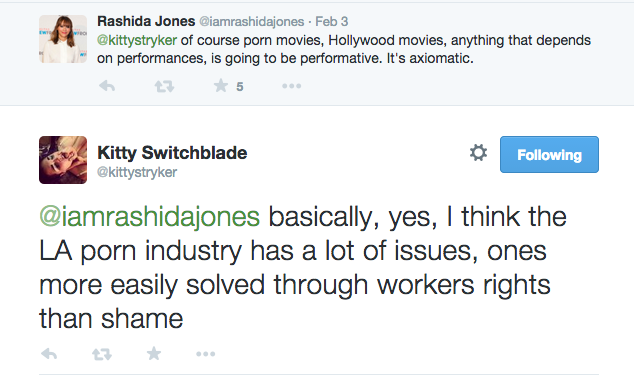
Rashida Jones replied (respectfully!) to Kitty Stryker‘s post earlier this week on Tits and Sass, and the two engaged in brief dialogue.
Thailand is amping up arrests of sex workers in an attempt to appear to be compliant with US regulations on trafficking.
SWOP-Seattle has written an open letter to lawmakers, asking them to stop bills that would enact the End Demand model in Seattle. You can sign the letter here.
Researchers at Carnegie Mellon have developed software that supposedly mines escort ads for information that can suggest the worker is being trafficked:
Traffic Jam gives police a rapid way to sort sex ads, spotting indirect language that may suggest sex trafficking, or grouping ads with similar language that may have been written by the same person.
A trafficking sting last weekend in Illinois resulted in the arrest of nearly 600 clients and 23 “so-called traffickers.” Given the ever-growing breadth of what that word is coming to encompass, one must wonder: were they pimps, boyfriends, coworkers sharing a space, or family members living off a sex worker’s income? Money and effort well spent?
No. And there is no rise in sex trafficking during sporting events, even Polaris and the Global Alliance Against Trafficking in Women agrees. This myth conflates sex workers with trafficking victims and encourages serious misuse of funds and time, like the Cook County trafficking sting in Illinois last weekend noted above.
For the first time in the 102 year history of the Alaskan Legislature, there’s an actual advocate for sex workers present: Tits and Sass contributor and longtime activist Terra Burns is in Juneau, educating the legislators on the effects of their laws on real live women.
“They really target things that people in the sex industry do to increase their own safety,” Burns said. “Things like working indoors or working together or even buying condoms for each other.”
She adds that Alaska’s well-intended legislation has unintended consequences.
“I think it shows they are more likely to victimize workers themselves than they are to protect the workers,” she said.
Despite ostensibly having heard or at least read what Terra has to say, Berta Gardner, the bill’s sponsor, says
“My bill does not affect sex workers — it affects victims of sex trafficking,” says Gardner. “It doesn’t touch sex workers who are voluntary sex workers in any way, shape, or form.”
And Terra is using social media to raise money for her efforts! The ability of sex workers’ to use social media will never not be news, apparently.
Also? Strippers age. Mic follows the true life stories of real women who get older, and how they deal with it.
Errrbecca translates this article on Chinese sex workers in a Parisian suburb:
They found themselves working seven days a week for 400 euros a month in under-the-table jobs. Without papers, without other opportunities, and with few French skills, some of them therefore decided, after working a handful of precarious jobs, to “go down to the sea” (xia hai). In China, this expression means to quit a public sector job in order to go into the private sector, with all the risks that involves. These women recycled the phrase to mean that – for example – they had gone from nannying to sex work.
Open Democracy combs through the rhetoric of abolitionists dedicated to ending “modern slavery,” comparing it to the historical abolitionist movement, and to trafficking and labor movements around the world.
While different themes require case-specific responses, this broadly means working to improve the rights and protections afforded to all migrants, sex workers, prisoners, domestics, supply chain workers, and other vulnerable populations. Instead of privileging individual cases, we need to be thinking in terms of collective transformation.
Members from the Global Network of Sex Work Projects and South African sex worker activist groups Sisonke, SWEAT collaborated on this guide to writing respectfully about sex work, including a handy example of bad writing about sex work for illustration.
The High Level Government and Civil Society Meeting in Trinidad discussed how to address and combat stigma and discrimination that make it difficult for at-risk populations like sex workers, people who inject drugs, and gay men to access healthcare and other services created to target and end the spread of HIV.
BONELA (Botswana Network on Ethics, Law and HIV/AIDS) commends Botlogile Tshirelets, Botswana’s Ministry of Local Government and Rural Development, and her support of sex worker rights.
Workers and activists in Northern Ireland are calling on the Justice Minister not to enforce the recently passed bill which criminalizes the purchase of sex.
A study of female sex workers in Mekelle City, Ethiopia, found that the rate of unintended pregnancy was 28.6%.
Sera Miles, the co-director of SWOP New Mexico, and Maggie McNeil were interviewed for this article on why “sex slave” is a misleading term that doesn’t have a place in the trafficking conversation.
German politicians may have agreed on the final details of a new law that would govern sex work, but actual sex workers are raising alarm and promising to resist the invasive measures included in the law. Undine de Rivière, a spokesperson for the sex worker union BeSD, said that
the rule requiring sex workers to be registered with the authorities, agreed by the parties in August, was unacceptable.
“If you have ‘sex worker’ written on your identity card, that’s an infringement against your right to have a private sex life,” she said.
She also pointed out that, rather than mandatory health tests,
“If it were really about protecting us and improving our lives, then they would extend…voluntary offers for advice and healthcare… there should be specialist centres run on a voluntary basis.”
The breakout hit of Sundance was Tangerine, a film about trans sex workers in LA, shot entirely on an iPhone 5.
The struggles of sex workers in Canada under C-36 continues.
This AP article on the efforts of Portland strippers to work with lobbyists to make a bill ensuring work place protections ends with Claude DeCorsi, the President of the Oregon chapter of the Association of Club Executives, giving the perfect illustration of why this is needed:
If regulations were needed, the industry should police itself, he said. The dancers’ work with lawmakers has surprised and confused DaCorsi and his colleagues, he said.
“How did it get to this point where entertainers got fed up to the point where they felt we need to enact a law or do some legislation around this?”
[My emphasis added.]
Meanwhile, the crusade of Portland strippers to introduce legislation promoting dancers’ rights in Oregon is picked up by Salon. Jenny Kutner interviews Tits and Sass contributor Elle Stanger. There are a few factual inaccuracies, such as the notion that stripping-as-employment would show up on a background check and that strippers in Portland are treated as independent contractors, but no one can deny the decrepit state of most Portland clubs.
In Taiwan, volunteers from the organization Hand Angel offers hand jobs and non-penetrative acts of physical intimacy to disabled people.
Italian sex workers escape the harsh anti-sex-worker climate in Italy by crossing the border to Switzerland where, despite regulation, they don’t have to worry about their cab drivers or land lords being arrested as criminals.
Roxane Gay lets Usher know that Shawty does mind, over at The Butter:
If I am working until three, I’m not leaving with you, asshole. I’m going home, to my own place that I pay for with my own money, because my knees and my back are killing me. My work is actual work and it is hard on the body. After a shift, I just want to take a long hot bath and then I want to sleep.
Ah, the kind of boyfriend who makes the punchline of that stripper joke so true.
Are you ready for a heavy dose of incomprehensible UK slang? The Dreamboys, a troupe of strippers, made an appearance on Geordie Shore. “Parsnip” means “penis.” I think.
And the Magic Mike XXL trailer is out!

Workers and activists in Northern Ireland are calling on the Justice Minister not to enforce the recently passed bill which criminalizes the purchase of sex.
I’m sure they are, but that link is actually to an article about the South (Republic) of Ireland, where the bill hasn’t been passed yet, and we’re trying to stop it! You can watch an interview with amazing Sex Workers Alliance Ireland activist Kate McGrew here.
oh thank you!! sorry about that
It’s still problematic, though, that Jones thinks journalists are “unbiased” relative to sex workers. In other movements– say, environmental rights– having had experience in the movement makes you an expert rather than biased.
Jenny Heineman — Here, here! I’m actually mistrustful of anyone who claims to be objective. What if they actually believe it? Universalist, much?
I agree, I thought that comment of Jones’ came off as condescending. I suppose if desiring human rights makes me biased, then yeah, I’m biased.
Idk, I prefer docs made by people who have a real stake in the game.